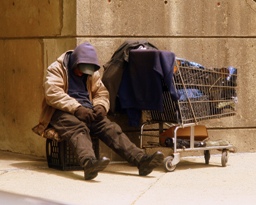I am “those people”
by Bob Kuhlman, Executive Director
 When I first started working with the men here at Emmaus, I’d often wonder how they got to be where they are in life. I’ve always thought of people like the guys (especially those struggling with homelessness or addictions) as “those people.”
When I first started working with the men here at Emmaus, I’d often wonder how they got to be where they are in life. I’ve always thought of people like the guys (especially those struggling with homelessness or addictions) as “those people.”
“Those people” are the ones that I pitied, but never wanted to be around. When I was growing up, they served as the prime example of what would happen to me if I didn’t work hard, do well in school, and get a good job. I’d end up like one of “those people.”
It only took a few months of being at Emmaus, though, for me to begin asking myself who “those people” really are. I mean, I had a clear image of what they looked like, and I could identify them really easily. But who are they?
After I started to answer that question— by building relationships with and getting to know them (especially the guys in the Ministry Center)—I began to confront the question of whether I am really better than these men at all. Living in my cozy suburban existence, I can pretend that none of the problems facing them touch my life.
Author Brené Brown has spent years writing and lecturing on the issue of poverty. When I started thinking about the stories and myths I have in my head about “those people,” I thought of a quote from Brown that really gets at the reality that we are—or easily could be—just one step away from joining the broken people I see all around me. Brown says:
We are “those people.” The truth is… we are the “others.” Most of us are one… paycheck, one divorce, one drug-addicted kid, one mental health diagnosis, one serious illness, one sexual assault, one drinking binge, one night of unprotected sex, or one affair away from being those people —the ones we don’t trust, the ones we pity, the ones we don’t let our children play with, the ones bad things happen to, the ones we don’t want living next door.
When I reflected on Brown’s words, I had to admit that in different circumstances I could be one of them: the poor, the pitied ones. So, how should I respond to those who are living these difficulties now? How do I make a difference in their lives?
I thought of Micah 6:8: “And what does the Lord require of you? To act justly and to love mercy and to walk humbly with your God.” It is an inspiring verse, but it seems so vague. How do I do these things? Give me a formula, or an easy answer, or something! But, as everyone in ministry learns sooner or later, no such formula or answer exists.
What I have found, though, is that living out this powerful, simple verse is not as difficult as it might sound. It just takes the willingness to take a simple step: to be open to love and connecting with another person. I’ve found that saying, “Hello! How are you?” is a good beginning. I let the relationship grow from there. Simple. Not flashy. But very soon I find that the ones I once called “those people” I now call “my friends.”
